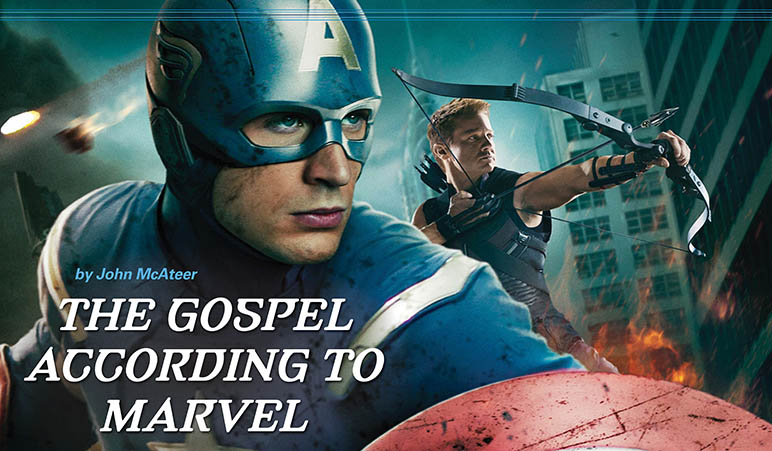Over the past decade, there has been a revival of interest in comic book superheroes, driven in large part by the Disney-owned Marvel Comics brand, publishers of such characters as Spider-Man, the X-Men, the Avengers, and more. Every culture has had its own heroes, from Hercules to King Arthur to the Lone Ranger, but the phenomenal popularity of Marvel superheroes in recent years suggests that Marvel’s unique approach to envisioning heroism is, for better or worse, feeding some sort of spiritual hunger in American culture. In the 1960s, Marvel transformed the entire comic book industry by introducing heroes who were ordinary people that found themselves with unique abilities and struggled to overcome personal weaknesses to use those abilities for the benefit of those in need. Marvel’s attempt to ground their heroes in a more realistic world than other superheroes led to at least two questionable results. First, the Marvel universe tends to avoid genuinely supernatural phenomena, instead explaining unusual events in science fiction terms. Second, as popular culture has coarsened in the decades since the 1960s, Marvel’s flawed heroes have had to become more violent to maintain their apparent psychological realism. This means that comic books are now less appropriate for children than they were in the past. On the other hand, the positive result of Marvel’s emphasis on ordinary, realistic people is that readers can identify with their flawed characters more easily than they could identify with the idealized heroes of yesteryear. This means that Marvel fans can imagine themselves as potential superheroes and learn to cultivate heroism in their own lives. Moreover, comic book stories give us a clear sense of good and evil and the human need for a Savior who is more than human, themes that Christian apologists can use to draw out the innate existential longing for Christ hidden in the heart of all people.
This Postmodern Realities episode is a conversation withJournal author John McAteer about his article “The Gospel According to Marvel. He answers questions including: Why is Marvel in particular doing so well at this moment? Marvel characters are less perfect compared to DC, but isn’t the point of a superhero to be a role model? Shouldn’t we want our heroes to be perfect? Does Marvel can go too far in making their heroes flawed? Are flawed and anti-heroes really role models for kids? How can apologists and other ministers make use of comics in talking with people about faith?
We’d also like to invite you to subscribe to the Journal. To subscribe to the Journal, please click here.
When you to subscribe to the Journal, you join the team of print subscribers whose paid subscriptions help provide the resources at equip.org that minister to people worldwide. These resources include our free online-exclusive articles, such as this review, as well as our free Postmodern Realities podcast.
Another way you can support keeping our resources free is by leaving us a tip. A tip is just a small amount, like $3 or $5, which is the cost for some of a latte, lunch out, or coffee drink. To leave a tip, click here.
Other articles and Postmodern Realities podcasts related to this topic:
Film Review: The Church without Claws? A Figurative Reading of the Film Black Panther
Episode 063: Black Panther Film Review with Eric Redmond
Episode 024: Dr. Strange (film review with spoilers)
Fighting Scientism with the Occult in Doctor Strange
Episode 017: Suicide Squad, Deadpool, and the Rise of the Comic Book Antihero
Suicide Squad, Deadpool, and the Rise of the Comic Book Antihero
Episode 139 Clear Skies, Hurt Hearts, Can’t Lose: Why Spielberg’s Aliens Help Make us More Human
Clear Skies, Hurt Hearts, Can’t Lose: Why Spielberg’s Aliens Help Make us More Human
Episode 123 Tolkien’s First Fellowship
Tolkien’s First Fellowship A film review of Tolkien
Episode 100: A. Hitchcock Films
“Caught Looking: Hitchcock’s Films in the Age of Instagram.”
Episode 001: The Films of Quentin Tarantino
Episode 067: Spielberg’s Nostalgia for Reality in Ready Player One
Spielberg’s Nostalgia for Reality in Ready Player One.”
Episode 054: The Last Jedi: A Star Wars Movie for the Era of “the Nones”
The Last Jedi: A Star Wars Movie for the Era of “the Nones”
Episode 027: “Evaluating the Star Wars Worldview”
May the Force Bewitch You: Evaluating the Star Wars Worldview
Episode 075: Film Nostalgia & Heaven
Looking for Heaven at the Movies: What our Fondness for Nostalgic Films Says about Us.”
“HBO’s Westworld and the Ethics of Artificial Intelligence.”
Episode 041: The Gracious Heroism of Wonder Woman
The Gracious Heroism of Wonder Woman
Jesus Films: Who Does Hollywood Say That I Am?
Episode 079: Theology of Morgan Freeman
“The Story of Morgan Freeman (Not God).”
The Artistic Pro-Life Theme in Netflix’s I Am Mother
Postmodern Realities Episode 132: The Artistic Pro-Life Theme in Netflix’s I Am Mother
The Matrix: Unloaded Revelations
Breaking Bad’s Addicting Defense of Moral Realism
A Wrinkle in Time: Drawing Apologetic Value from a De-Christianized Film
